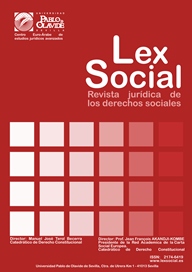The non-discrimination principle and personal data protection in the context of the EU digital COVID certificate
DOI:
https://doi.org/10.46661/lexsocial.6452Palabras clave:
European constitutionalism, non-discrimination, state of emergency, right to free movement, personal data protection, public interestResumen
The measures adopted so far, on EU Members-States level, aiming at containing Covid-19 have, very often, demonstrated an extremely fragmented, un-coordinated and controversial policy-making process. On July 1st, 2021, the EU Digital Covid Certificate entered into application throughout the EU seeking to provide for a common, harmonized, common legal framework in order to protect public health, re-open the borders, re-activate European economy, and facilitate the free movement of individuals during pandemic through establishing secure, verifiable, and interoperable measures across the EU territory. Issues of non-discrimination and equality, freedom of movement, working conditions, data protection, asylum and migration, human dignity, the rule of law, and the overall respect for human rights have been raised.
Descargas
Citas
BJORNSKOV, Steven and VOIGT, Stefan, "The State of Emergency Virus", 19 April 2020, available at https://verfassungsblog.de.
COTTIER, Damien, "Covid passes or certificates: protection of fundamental rights and legal implications", Coucil of Europe- Committee on Legal Affairs and Human Rights, 17 May 2021, available at http://assembly.coe.int.
FEILER, Lukas, FORGO Nikolaus and WEIGL, Michaela, "The EU General Data Protection Regulation (GDPR): A Commentary", Globe Law and Business, 2018.
GROGAN, Joelle, "States of Emergency", 26 March 2020, available at https://verfassungsblog.de; https://doi.org/10.2139/ssrn.3611057
JAKAB, András, "German Constitutional Law and Doctrine on State of Emergency - Paradigms and Dilemmas of a Traditional (Continental) Discourse", 7 German Law Journal, pp. 453-477, 2006. https://doi.org/10.1017/S207183220000479X
LANG, Iris Goldner, "Should the EU Have a 'Digital Green Pass','Vaccination Certificate' or Better Nothing?, 16 March 2021, available at ttps://verfassungsblog.de.
LOUGHLIN, Martin and DOBNER, Petra (eds.), "The Twilight of Constitutionalism?", Oxford University Press, 2010.
PARIS, Evelyn, "Applying the Proportionality Principle to COVID-19 Certificates", European Journal of Risk Regulation, pp. 1-11, 2021. https://doi.org/10.1017/err.2021.27
PERNICE, Ingolf, "Multilevel constitutionalism and e-democracy", 4 May 2016, available at https://policyreview.info, who analyses the concept of constitutionalism also within the internet ecosystem.
PERNICE, Ingolf, "Multilevel Constitutionalism and the Treaty of Amsterdam: European Constitution-Making Revisited?", 36 Common Market Law Review, pp. 703-750, 1999. https://doi.org/10.1023/A:1018744426756
PLATON, Sebastien "From One State of Emergency to Another - Emergency Powers in France", 9 April 2020, available at https://verfassungsblog.de.
SACCIA, Gino "Proportionality and the Balancing of Rights in the case law of European Courts", 20 Februar 2019, available at https://www.federalismi.it.
TEUBNER, Gunther "Constitutional Fragments: Societal Constitutionalism and Globalization", Oxford University Press, 2012. https://doi.org/10.1093/acprof:oso/9780199644674.001.0001
TSAGOURIAS, Nicholas (ed.), "Transnational Constitutionalism-International and European Perspectives", Cambridge University Press, 2007. https://doi.org/10.1017/CBO9780511495076
VAN GERVEN, Walter, "The effect of proportionality on the actions of Member States of the European community: national viewpoints from Continental Europe", in Evelyn Ellis (ed.), "The Principle of Proportionality in the Laws of Europe", Hart Publishing, 1999.
VENIZELOS, Evangelos "Lectures on Constitutional Law" (in Greek), Sakkoulas Athens-Thessaloniki, 2021.
VENIZELOS, Evangelos "Pandemic, Fundamental Rights, Democracy" (in Greek), 26 March 2020, available at https://evenizelos.gr.
Descargas
Publicado
Cómo citar
Número
Sección
Licencia

Esta obra está bajo una licencia internacional Creative Commons Atribución-NoComercial-SinDerivadas 4.0.
-
Atribución — Usted debe dar crédito de manera adecuada, brindar un enlace a la licencia, e indicar si se han realizado cambios. Puede hacerlo en cualquier forma razonable, pero no de forma tal que sugiera que usted o su uso tienen el apoyo de la licenciante.
-
NoComercial — Usted no puede hacer uso del material con propósitos comerciales.
-
CompartirIgual — Si remezcla, transforma o crea a partir del material, deberá difundir sus contribuciones bajo la misma licencia que el original.


 Lex Social
Lex Social

 @lexrevista.bsky.social
@lexrevista.bsky.social


